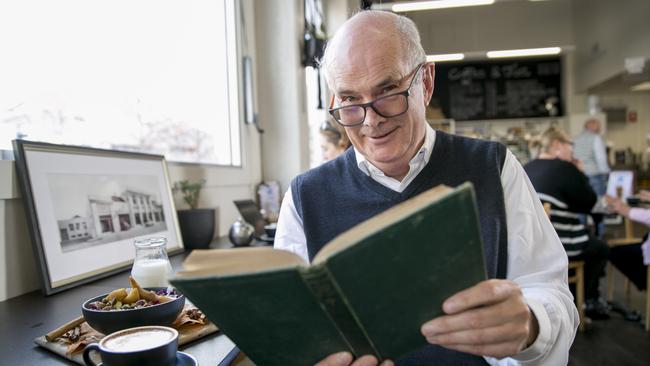Cafe Society: Keeping it local is secret of success for Hobart bookstore
A local literary giant in many respects, Clive Tilsley is eager to preserve the art of reading books.

Tasmania
Don't miss out on the headlines from Tasmania. Followed categories will be added to My News.
PERHAPS it’s the weather. Clive Tilsley has a few theories on why Tasmania sells more books per capita than other states.
It’s a cosy concept, and so is Clive’s explanation for the way he has weathered the disruption of online giants such as Amazon.
“Our saviour is being part of a community,” says Clive, who owns Fullers Bookshop in Hobart. “Amazon and whoever else cannot do things in Hobart the way we can. They don’t know who the people are.”
Tasmania’s troubled history, dramatic landscapes and small communities are inspirations for many writers who call the island home, and Clive says the state also is an ideal place for an indie bookstore that relies on connectivity.
“It’s a good strength being small, it’s a good strength being an island, and it’s a good strength being the most southern destination in Australia,” he says.
“We connect with one another and everybody knows everybody else. And while it’s not a good thing sometimes, it’s a wonderful thing other times.”
MORE CAFE SOCIETY:
TAKE ADVANTAGE OF THE GOOD OIL
THE HOUSING DEBT WE DON’T NEED
HOBART NEEDS TO SPEAK WITH ONE VOICE
FINDING SOLUTIONS TO TASMANIA’S TOURISM CONUNDRUM
I’LL BUILD THE FERRIES, SAYS CLIFFORD
As Fullers Bookshop heads into its 100th year, Clive is counting on strong service to carry it into the future. It fits the way many Tasmanians like to live.
“We have a lot of staff here,” he says. “The idea is you can come in here any time and have a conversation about the books you are buying. We are an oasis for a lot of people who want to read, think and have a proper conversation.”
He says online algorithms are able to generate only vague approximations of the reader recommendations a local bookseller can give his or her regular customers.
“Employing checkout chicks is not what bookselling is about. We can put things in people’s hands they would never have otherwise found.”
When we meet at Fullers’ Afterword Cafe, tables buzz with conversation and bookstore staff roam the floor helping customers pinpoint titles of interest.
Clive estimates he has 10 per cent of Tasmania’s population on his customer data base. “That’s a huge percentage,” he says.
He gestures up Collins St towards an Indian restaurant where historian Cassandra Pybus organised the Tasmanian launch of The Handmaid’s Tale — now a hit TV drama — by Canadian writer Margaret Atwood in 1985.
When she returned in 2001, Atwood drew her biggest Australian crowd to a booked-out event hosted by Fullers at Federation Concert Hall, which seats 1100.
“That really started something,” says Clive.
These days, Hobartians can be entertained and enlightened at local bookshops year round. Six years ago Fullers Bookshop hosted about 30 events annually, but by last year that number had soared to 148. Tomorrow is the launch of Launceston novelist Rohan Wilson’s Daughter of Bad Times, with The Australian’s literary editor Stephen Romei, at 5.30pm.
With the Tasmanian Writers’ Centre barely afloat after Government funding was withdrawn and the board resigned en masse more than a year ago, bookshops are more than ever hubs for the reading and writing community.
With the TWC’s biennial writing festival in doubt, Clive plans to roll out a series of modest literary weekends in regional Tasmania, kicking off in Swansea with the courthouse launch of David Owen crime novel Why Neville Shot Gus, from the Fullers Publishing imprint.
He likes the idea of micro-festivals.
We may be in a golden age of writing, and our reading community is loyal, engaged and curious, but Clive worries readership overall is dwindling, with the instant gratification of the internet seducing would-be readers.
“It’s the biggest threat to the book trade,” he says.
Booksellers rely more than ever on runaway bestsellers to save the day. “Every six or eight years a book like Robert Hughes’ The Fatal Shore, [Alvin Toffler’s] Future Shock, Elena Ferrante, or even an EL James [of the saucy Fifty Shades trilogy] turns up.”
Beyond the commerce aspect, he holds deeper concerns. What are the chances of us devoting time to deep thinking if we are not reading books?
He mentions journalist Stan Grant’s searching new title, Australia Day. “That’s the sort of book where you sit down with a writer in your own space in your own time to think about what is being written. I reckon that’s important. And sometimes only a book can offer that.”
Tasmania’s low literacy rate also troubles him, and is the bookshop’s charitable focus. As well as the Indigenous Literacy Foundation, he supports former Tasmanian of the Year Rosalie Martin’s literacy initiatives, which include a 100 per cent literacy goal for the state.
Low literacy on one hand, a treasury of literary talent on the other — it’s a classic Tasmanian story that for every Richard Flanagan, Danielle Wood or Heather Rose, there is a Tasmanian who cannot read well enough to get through their books. “Education, reading, writing, literacy — you can’t get away from these things,” says Clive.


